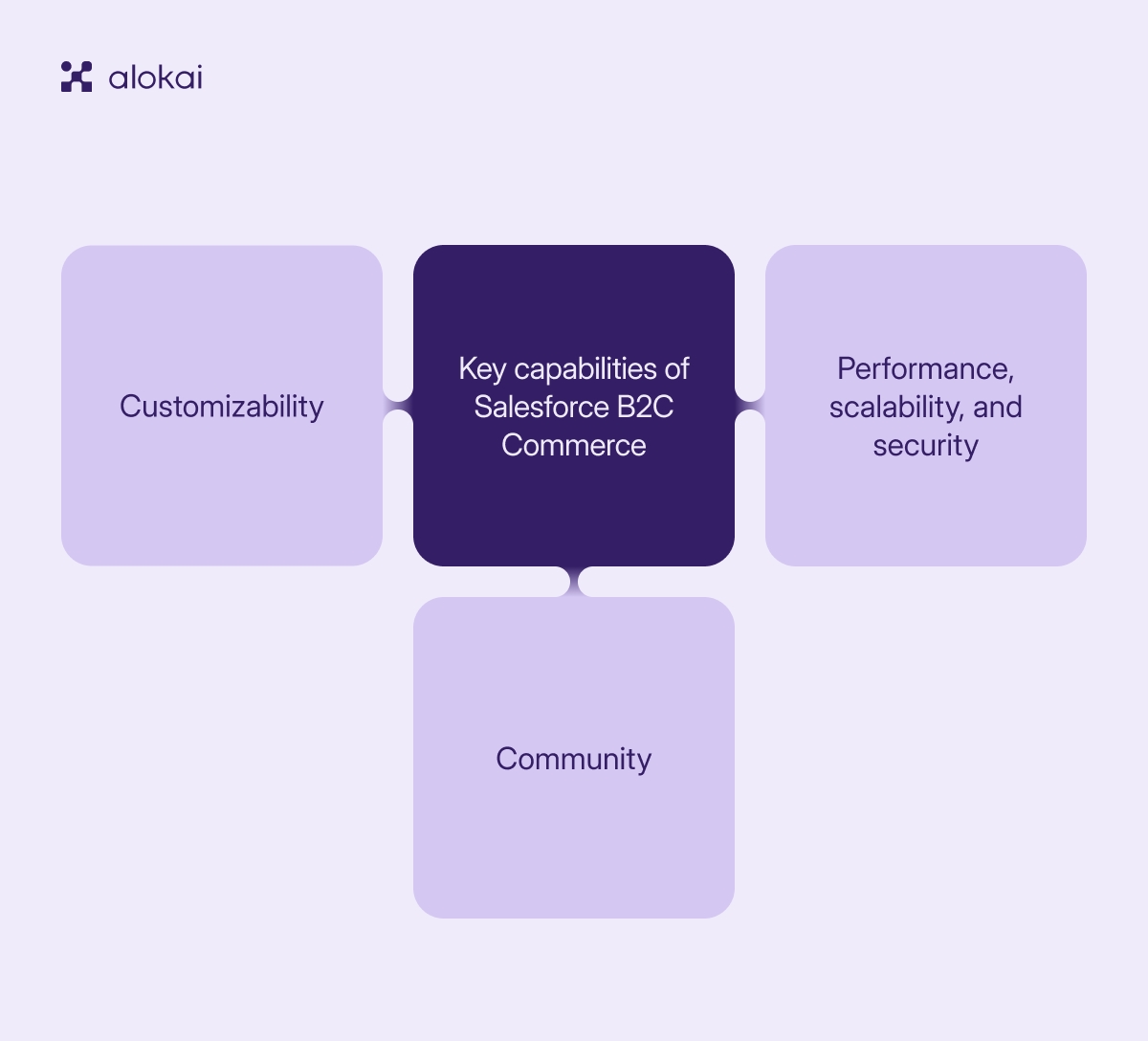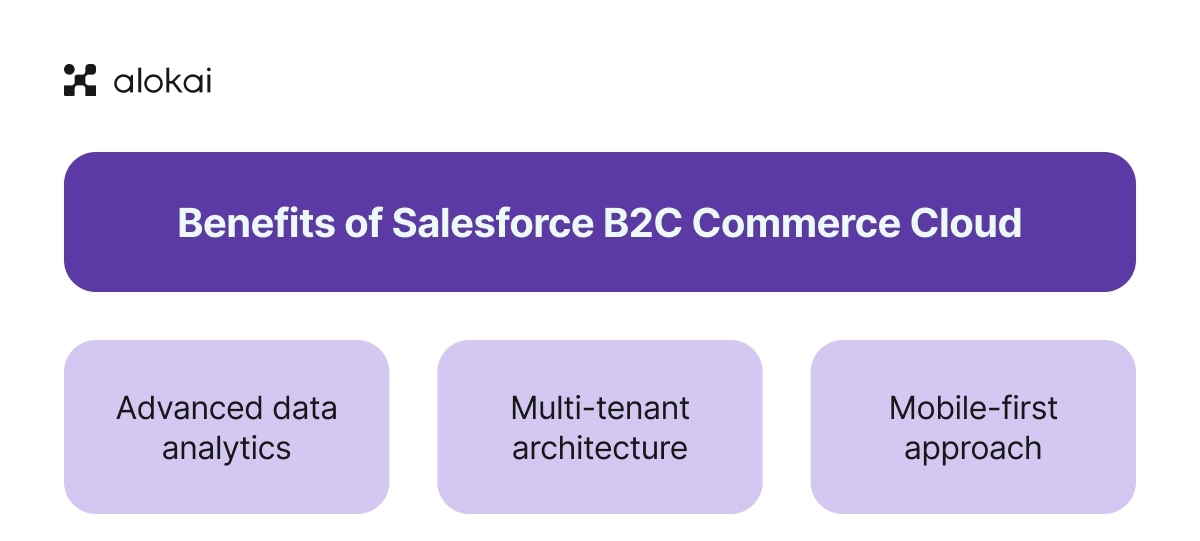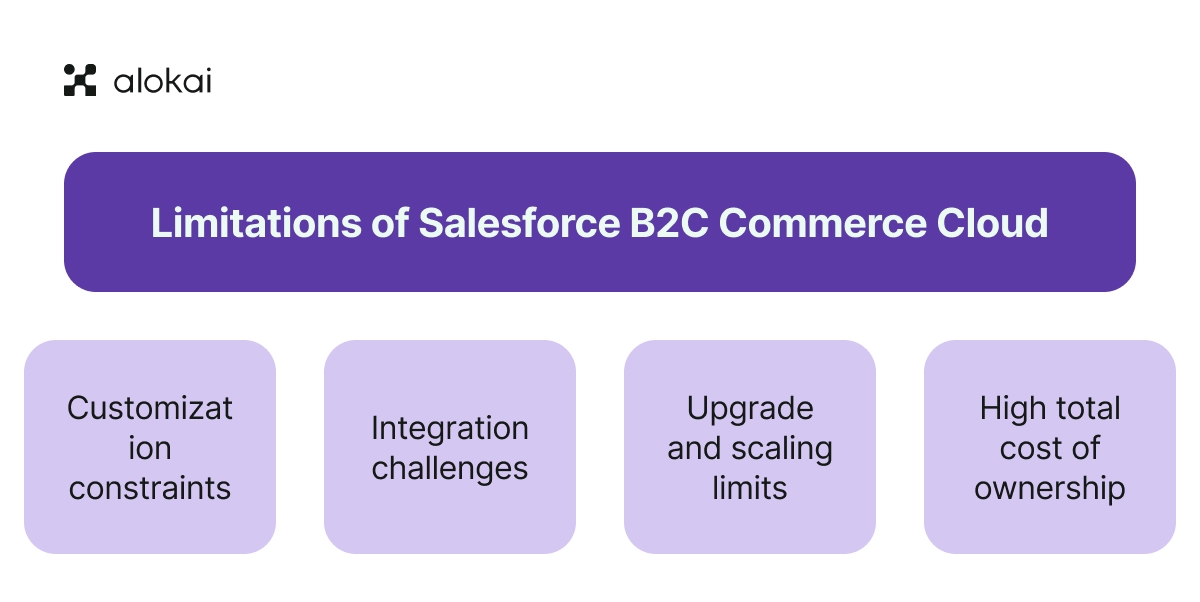With more consumers turning to online shopping, businesses must enhance their ecommerce sites and use advanced tools to remain competitive. Retailers who excel in B2C commerce can better understand their customers, respond to market changes swiftly, and ultimately drive higher sales and customer satisfaction.
A major advantage of B2C commerce is that retailers can create and coordinate shoppers’ online experiences. This control enables businesses to tailor their marketing strategies, personalize customer interactions, and optimize the user journey across various touchpoints. From the initial product discovery to the final purchase, every step can be fine-tuned to meet the consumers’ needs and preferences.
What is Salesforce B2C Commerce?
Salesforce B2C Commerce is a platform designed to streamline and enhance online retail operations.
Originally bolstered through the acquisition of Demandware, Salesforce B2C Commerce has evolved into a powerful tool that offers a comprehensive suite of features for managing ecommerce sites and an order management system. This platform stands out for its ability to integrate various tools and services, ensuring businesses can create and manage their online stores with ease.
At its core, it provides businesses with the capability to effectively extend commerce activities. From sophisticated merchandising techniques to advanced marketing strategies, the Salesforce platform is equipped to handle all aspects of online retail. This holistic approach helps businesses engage customers more deeply and drive higher conversion rates.
Areas of support for B2C companies
B2C Commerce is an enabler in several key areas that are essential for businesses to effectively manage their online retail operations:
- Merchandising and marketing: Provides tools for managing a dynamic product catalog and personalizing marketing efforts through promotions, AI-driven recommendations, and integrated email campaigns.
- Multi-site management and localization: Supports the operation of multiple ecommerce sites with features for localization, including language, currency management, and compliance with local regulations.
- B2C commerce extensions: Extends commerce functionalities to mobile and social platforms, while integrating with marketplaces and enhancing customer service capabilities.
- Commerce storefront: Offers customizable web design templates and a robust content management system, bolstered by advanced search functionalities and strict security protocols.

Salesforce B2C Commerce features
Salesforce B2C Commerce offers a comprehensive suite of features designed to enhance the ecommerce experience for both businesses and consumers. Here are some of the key features:
Storefront features
| Checkout and integrations
| AI and analytics
|
Salesforce B2C Commerce integration capabilities
Integration capabilities are a cornerstone of the software, allowing businesses to connect with external solutions seamlessly. The Salesforce platform offers robust API integration capabilities, enabling efficient communication with third-party apps. This is facilitated through two primary APIs: OCAPI and SCAPI.
These APIs enable the integration of various CRM and SaaS services, simplifying the management of customer relationships and other essential business functions. The ability to use REST APIs and Headless APIs further enhances this integration, ensuring that businesses can extend their commerce activities effectively.
Learn more about going headless with SFCC.
Benefits of Salesforce B2C Commerce Cloud
Salesforce B2C Commerce Cloud offers numerous benefits that can significantly enhance the operations of online retailers.

Advanced data analytics
A notable advantage is the Salesforce platform’s ability to efficiently collect and analyze customer data. These insights can be used to refine marketing strategies and improve business outcomes.
A variety of supported solutions to enrich your architecture
The multi-tenant architecture of Commerce Cloud allows companies to share infrastructure while accessing updated features in the data cloud. This setup ensures that businesses always have access to the latest tools and capabilities without requiring extensive infrastructure investments.
Optimized for scalability
The platform's robust marketing tools and mobile-first approach ensure that businesses can optimize their content and reach targeted audiences effectively through multiple channels. With comprehensive customer support integrated into the platform, businesses can provide seamless service and support to their customers, enhancing the user’s online experience and overall satisfaction.
Salesforce CC limitations for B2C retailers
Despite its comprehensive features, Salesforce Commerce Cloud, as a traditionally monolithic platform, does present some common limitations and constraints for B2C merchants:

Customization constraints
Due to its monolithic nature, Salesforce Commerce Cloud can be less flexible in allowing deep customizations or modifications that deviate significantly from the default platform capabilities. This can limit brands in tailoring the user experience exactly to their vision.
Integration challenges
While Salesforce Commerce Cloud supports various integrations, connecting with third-party systems that are not pre-configured or natively supported can require extensive custom development, potentially increasing costs and complexity.
Upgrade and scaling limitations
Upgrades can sometimes be slow and disruptive, as they need to be rolled out across the entire platform, affecting all connected systems and services simultaneously. Scaling the platform during high-traffic periods or for business growth can be challenging without impacting performance, due to the intertwined components of its architecture.
Cost considerations
The comprehensive features and capabilities come at a high total cost of ownership, including licensing, custom development, and maintenance fees, which can be prohibitive for smaller operations or those with variable demands.
Salesforce B2C Commerce implementation
Implementing B2C Commerce involves a systematic approach to ensure all features are effectively configured.
The initial step is to create feeds for a new site within the Business Manager, which serves as the control center for managing ecommerce sites. This step is crucial for setting up the foundation of the online store.
Correct permissions must be assigned to access the necessary tools and resources for customization. This ensures that all team members have the appropriate access to perform their tasks efficiently. Additionally, the Salesforce platform provides intuitive tools and templates, simplifying the setup process and enabling businesses to focus on customization and optimization with an enterprise resource planning system.
A systematic approach to implementation involves configuring the various features and capabilities of B2C Commerce Cloud. This includes setting up product catalogs, integrating payment solutions, and configuring marketing tools. A structured process ensures smooth and successful implementation.
Why partner with Alokai?
Partnering with a Frontend-as-a-Service solution, like Alokai, can significantly enhance the benefits of Commerce Cloud.
Alokai stands out for its ready-made integration designed for Salesforce Commerce Cloud, streamlining the modernization process. With a ready B2C storefront, businesses can expedite development while simultaneously building customized customer journeys. The platform's pre-built integrations offer seamless connectivity with headless CMSs, search, and payment solutions.
.svg?auto=webp&width=592&format=pjpg&disable=upscale&quality=100&dpr=1)
Alokai provides a reliable infrastructure with a 99.9% uptime SLA, ensuring businesses can operate smoothly and securely. This reliability is crucial for maintaining customer trust and satisfaction. Alokai's Frontend as a Service solution makes composable commerce easier for enterprise merchants.
As a result, you can see more tangible benefits from your gradual adoption of composable stack faster and for lower costs.
Mastering Salesforce B2C Commerce Cloud can transform how businesses operate online, providing the tools and capabilities needed to stay competitive in today’s digital landscape. From comprehensive integration capabilities to robust marketing tools, the platform offers everything a business needs to succeed in ecommerce.
Choosing Alokai can further enhance these benefits, ensuring a smooth implementation and ongoing support. By leveraging Commerce Cloud's full potential, companies can enhance customer experiences, drive sales, and achieve sustainable growth.
